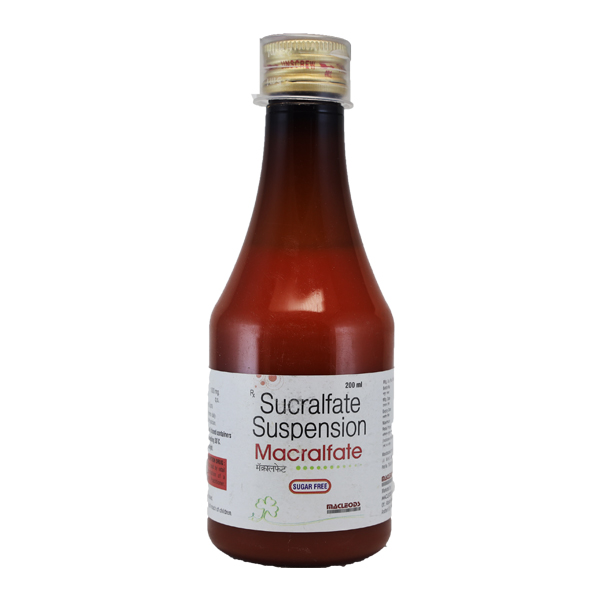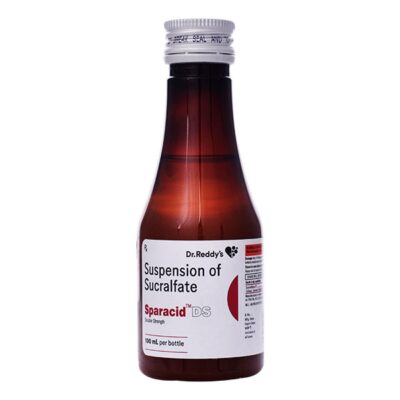🛡️🧃💊 Sucralfate 1000mg Suspension: Gastroprotective Shield for Ulcer Healing and Mucosal Relief
Sucralfate 1000mg suspension is a therapeutic oral liquid used primarily for the treatment and prevention of gastric and duodenal ulcers. It is also effective in managing gastritis, esophagitis, and other gastrointestinal (GI) conditions involving mucosal injury or inflammation. Sucralfate acts locally (not systemically), forming a protective barrier over ulcerated and inflamed areas, allowing the tissues underneath to heal effectively.
🔬 Mechanism of Action
Sucralfate is a basic aluminum salt of sucrose octasulfate. In the presence of stomach acid, it undergoes polymerization and forms a sticky, viscous gel that binds to ulcer sites and damaged mucosa.
Its therapeutic effects include:
-
Creating a protective coating over ulcerated tissue
-
Shielding the mucosa from acid, bile salts, and digestive enzymes like pepsin
-
Promoting healing of ulcers and erosions
-
Stimulating prostaglandin production, epidermal growth factor, and mucus secretion, which support mucosal regeneration
Notably, Sucralfate does not neutralize stomach acid, making it different from antacids and proton pump inhibitors (PPIs).
📌 Indications and Uses
Sucralfate 1000mg suspension is indicated for:
-
Duodenal ulcers (short-term treatment and maintenance)
-
Gastric ulcers
-
Gastritis (both acute and chronic)
-
Reflux esophagitis
-
Stress ulcers in critically ill patients
-
Stomatitis or oral mucositis (off-label)
-
Prevention of aspiration pneumonitis (off-label use in ICUs)
Because of its local action and coating effect, it’s also used in conditions where acid suppression is not preferred or possible.
💊 Dosage and Administration
-
Usual adult dose: 1 gram (5–10 mL) of suspension, taken 4 times daily before meals and at bedtime
-
Treatment typically lasts 4 to 8 weeks
-
Should be taken on an empty stomach for best adherence to the mucosa
-
Avoid eating or drinking anything for 30 minutes after taking the suspension
-
Shake the bottle well before each use
Children’s dosing varies and should be directed by a physician.
⚠️ Precautions and Warnings
-
Use with caution in renal impairment due to aluminum absorption and accumulation
-
Avoid long-term use without medical supervision
-
May affect the absorption of other oral medications (take other medicines at least 2 hours before or after Sucralfate)
-
Safe in pregnancy and lactation when prescribed appropriately
🤒 Side Effects
Sucralfate is generally well-tolerated due to minimal systemic absorption. However, possible side effects include:
Common:
-
Constipation (most frequent)
-
Dry mouth
-
Nausea
-
Gas or bloating
Rare:
-
Allergic reactions (rash, itching)
-
Aluminum toxicity (in patients with kidney failure)
-
Bezoar formation (very rare, especially in tube-fed patients)
🔄 Drug Interactions
Sucralfate may interfere with the absorption of:
-
Digoxin
-
Phenytoin
-
Fluoroquinolones
-
Levothyroxine
-
Theophylline
To minimize interactions, space doses by at least 2 hours from other medications.
🧊 Storage Instructions
-
Store at room temperature (15–30°C)
-
Keep tightly closed and protected from light and moisture
-
Shake well before use
-
Keep out of reach of children
📝 Conclusion
Sucralfate 1000mg suspension is a reliable, mucosa-protective agent that plays a key role in ulcer healing and gastric protection. With its non-systemic action and effective local coating, it offers safe symptom relief and promotes mucosal recovery, particularly for patients where acid suppression therapy isn’t ideal. With proper timing and consistent use, it provides long-lasting relief and promotes healing in upper GI disorders.
Note: This information is intended for educational purposes and should not replace professional medical advice. Always consult a healthcare provider for personalized guidance.




Reviews
There are no reviews yet.